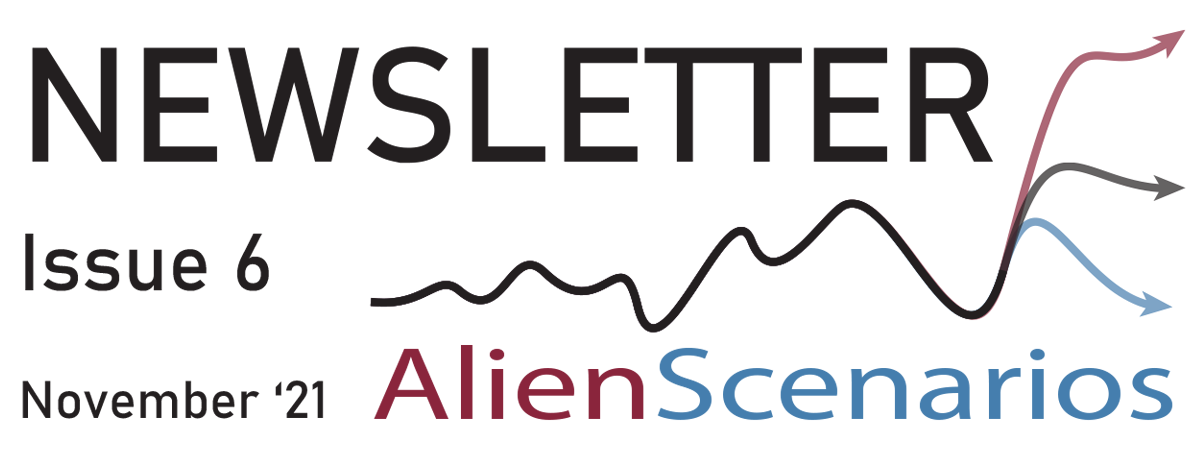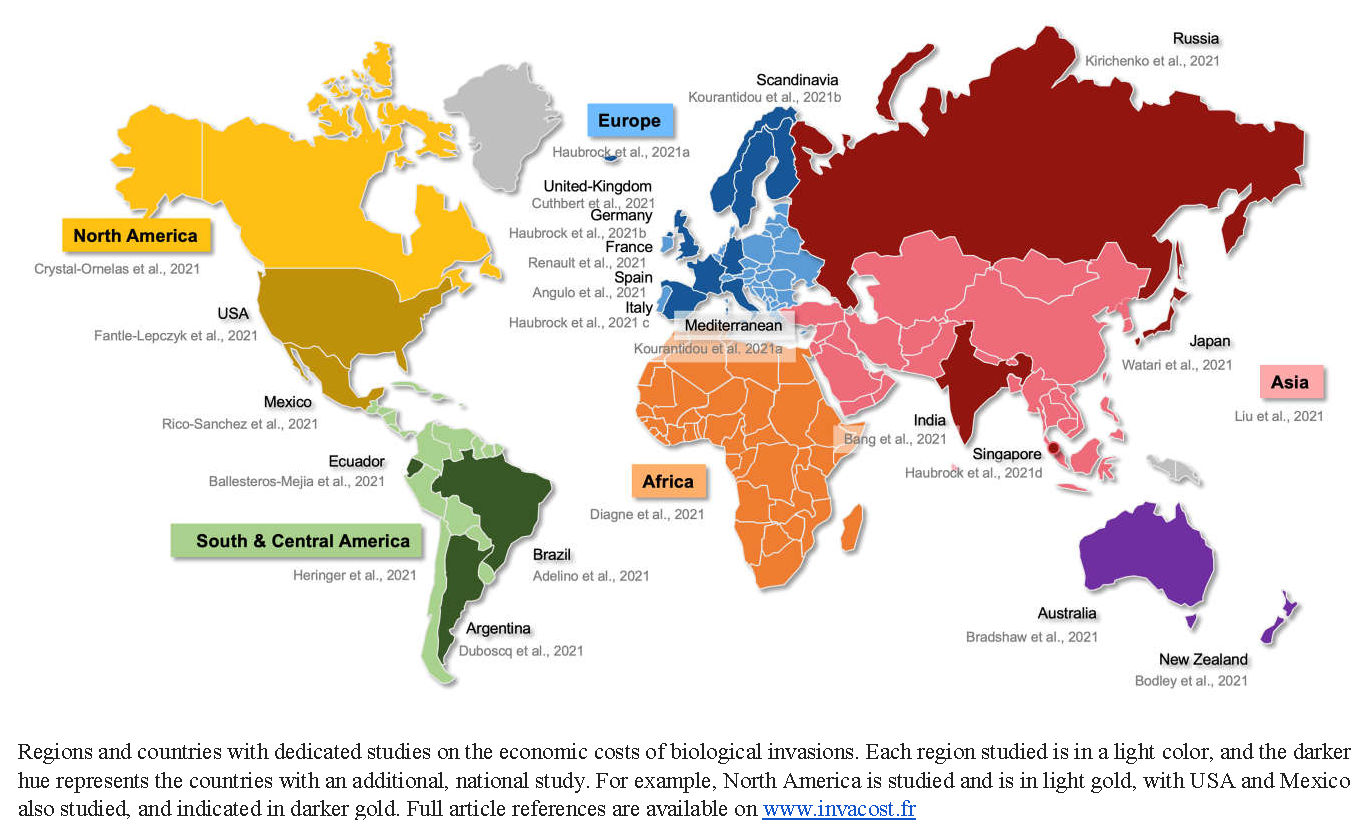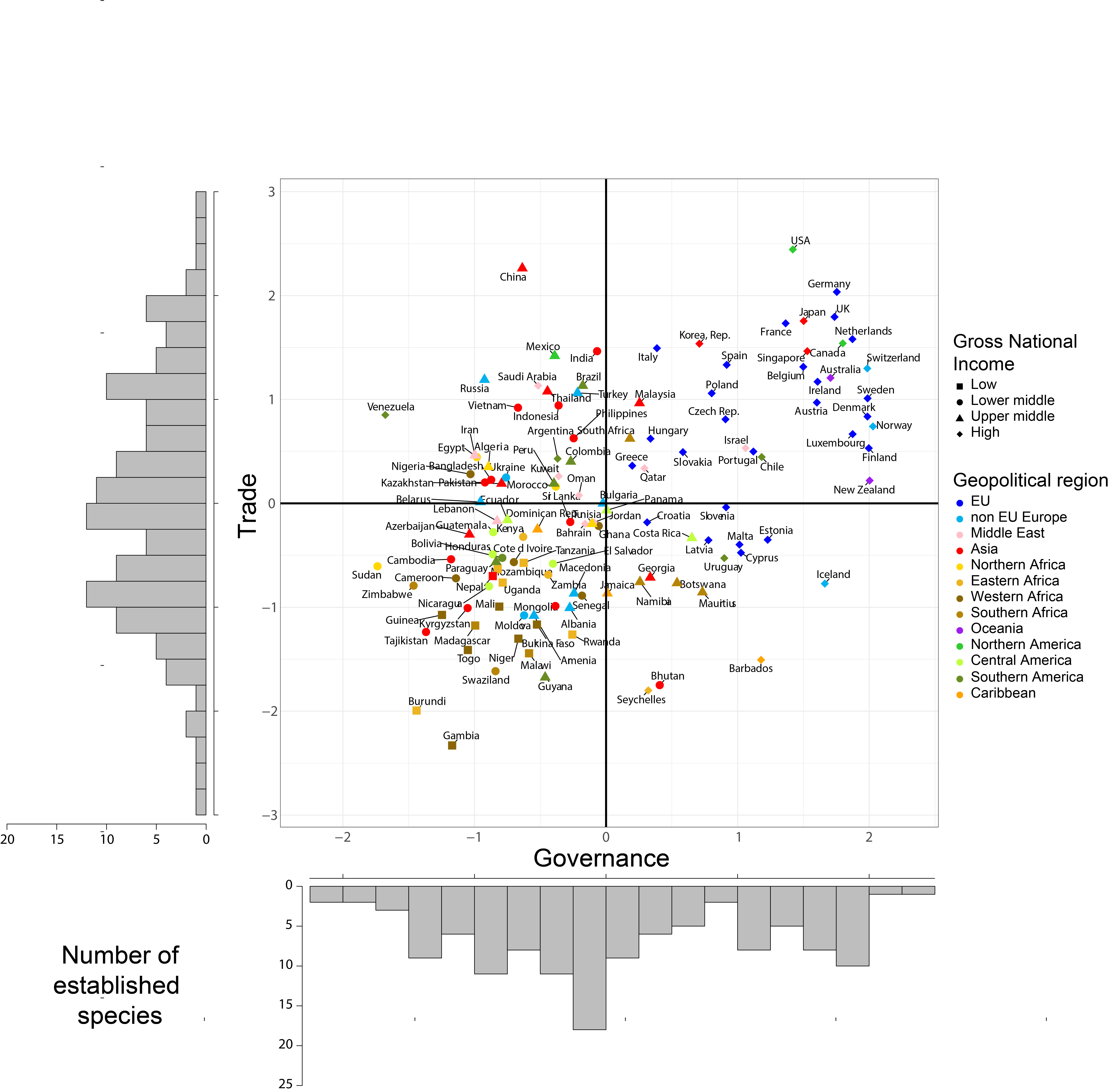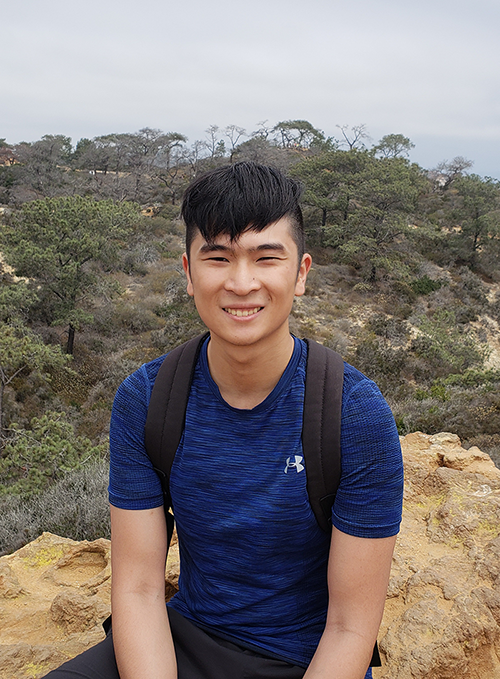
@AlienScenarios
franz.essl@univie.ac.at
bernd.lenzner@univie.ac.at
adrian.garcia@univie.ac.at
| Having trouble viewing this email? View it in your browser, or get it as a pdf. |
 |
https://alien-scenarios.org @AlienScenarios franz.essl@univie.ac.at bernd.lenzner@univie.ac.at adrian.garcia@univie.ac.at |
|
|
|
|
|
Good
day! |
|
The economic costs of biological invasions in the world |
Understanding and estimating economic damages and expenditures associated with invasive alien species (IAS) is particularly important for both research and management purposes. This is even truer given that new introductions of alien species and impacts are increasing globally with no sign of slowing down. Numbers and types of IAS vary across ecosystems and contexts, therefore impacts and costs of biological invasions differ widely over space and time. Improving our global knowledge on the economic costs of biological invasions across areas will help scientists, managers, and stakeholders to develop cost-efficient solutions and inform policies for dealing with IAS. However, a detailed and standardized assessment of these costs was lacking for most countries and regions worldwide. The recent advent of the InvaCost database –the first comprehensive and harmonized compilation of the economic costs associated with biological invasions worldwide– offers unique opportunities to investigate these complex and diverse costs at different scales. Based on this novel resource, a group led by Christophe Diagne and Franck Courchamp prepared a Special issue on the "The Economic costs of biological invasions in the world", which was published in Neobiota on July 29. This special issue involved 63 authors (most of them belonging to the InvaCost consortium) and brought together 19 papers from 13 countries and 6 supra-national regions that report on the economic cost-dimension of biological invasions. Along with some articles on other countries published –by this same group– in other journals, all these studies provide a global, innovative perspective detailing the economic costs of biological invasions while also providing regional information to help raise public awareness, and support efficient and cost-effective decision-making. In addition to providing detailed accounts of economic costs in each country or regions studied, these papers, systematically lead by local authors, offer original analyses and unique perspectives in a hitherto understudied topic. |
 |
|
IPBES Invasive Alien Species Assessment - External Review 15.12.21-15.02.22 |
| |
The IPBES Invasive Alien Species Assessment is starting its second and last external review process from 15 December 2021 to 15 February 2022. Governments and experts (e.g., scientists, decision makers, practitioners and other knowledge holders) are invited to comment on the individual chapters of the report, as well as on the summary for policy makers. We encourage all of you to register as a reviewer to the assessment and provide comments to individual sections that fit your expertise. This assessment will provide a comprehensive synthesis of the alien species literature and evidence and it is thus essential to have many people from different backgrounds heard and their expertise included in the report. The summary for policymakers of the invasive alien species assessment and its chapters is scheduled to be discussed and approved for acceptance at IPBES 10, currently planned for April/May 2023. Bernd Lenzner, Hanno Seebens, Franck Courchamp and other AlienScenarios members are actively involved in the development of this assessment. For information on how to register as a reviewer and access the documents, additional information will be shared by IPBES at the beginning of the review period and will then be available on the webpage. |
|
"Capacity of countries to reduce biological invasions" now available on bioRxiv |
|
How do countries differ in their capacity to reduce biological invasions? This paper, now available as a preprint on bioRxiv, quantifies the main drivers identified as crucial for making scenarios about global futures of biological invasions at the country level, and assess how they contributed to: i) the number of established alien species per country and ii) the proactive and reactive capacity of countries to address biological invasions. This reveals a heterogeneous world in which different countries are aligned with the different scenarios previously identified at the global level by the AlienScenario team (available as an article published here). As socio-economic and environmental drivers will have lasting effects on biological invasions over following decades, it is important to understand how their trajectory have and will change with respect to these drivers. The paper is led by Guillaume Latombe, and involves Franz Essl, Hanno Seebens, Bernd Lenzner, Franck Courchamp Stefan Dullinger, Marina Golivets, Ingolf Kühn, Brian Leung, Núria Roura-Pascual, Christophe Diagne Jonathan Jeschke, Cristian Pérez-Granados Dietmar Moser and Anna Turbelin from the AlienScenarios team. |
 |
|
AlienScenarios early career researchers in the spotlight |
|
In
each issue of the Newsletter, we highlight early career
researchers who are part of the AlienScenarios team. In this
sixth issue, meet Anna and Dat! |
| |
Anna Turbelin I am a post-doc in the Biodiversity Dynamics & Macroecology group at the Ecology, Systematics & Evolution Lab (University Paris-Saclay, France). I am involved in the AlienScenarios WP3 (Evaluating impacts on ecosystem services and human livelihoods) and currently work on the economic costs of biological invasions. I have a multi-disciplinary background, having done a BSc. in International Business and Management, worked in industry and studied for a Masters and PhD in Physical Geography. I am interested in most fields of research, however, my focus is on biological invasions, policy, macro-ecology and interactions between invasive alien species and natural hazards. In my free time, I tend to exercise, explore new places, paint furniture, sew and be a slave to cats. If I were a song, I would be Hakuna Matata, Lion King. If I were a painting, I would be Antipode King, by Hunderwasser. If I were a fictional character, I would (like to) be Alice in Wonderland. If I were an alien species, I would be Neovison vison, the American mink. |
| Dat Nguyen I am a research assistant working under Brian Leung at McGill University in Montreal, Quebec, Canada. I recently completed my Master's thesis, which examined the transferability of species distribution models (SDMs) in the context of biological invasions at the global scale, and the factors that may contribute to their success or failure. I have been working on developing forecasting models of shipping traffic through the Panama Canal, and linking global drivers of invasions to the regional level for prediction. As a member of AlienScenarios, I am working with Brian Leung on WP6, as well as the ongoing drivers data project led by Hanno Seebens. On my personal time, I enjoy hiking and playing with my dog Beckett. I am also a fan of listening to music, playing video games, and an avid collector of both comic books and headphones. If I were a song, I would be This Must Be The Place –Naive Melody– by Talking Heads. If I were a painting, I would be Heads in a Landscape –Cabezas en un paisaje–, by Francisco de Goya. If I were a fictional character, I would be Hiccup from the "How to Train your Dragon" films. If I were an alien species, I would be Bromus tectorum (cheatgrass). |
 |
 |
 |
|
Contact Us Visit us on the web at https:\\alien-scenarios.org |
If you no longer want to receive our emails, you can un-subscribe here. |